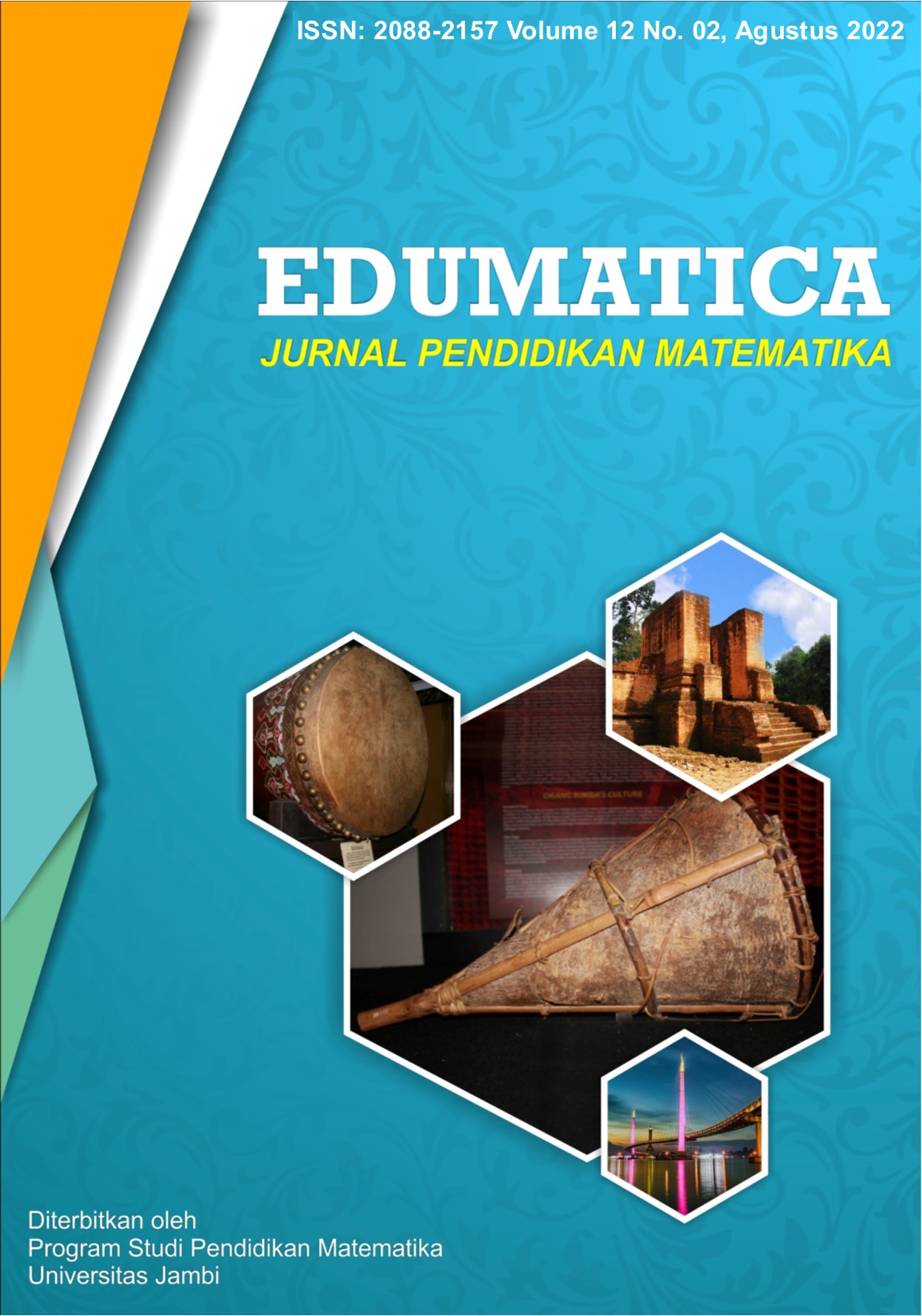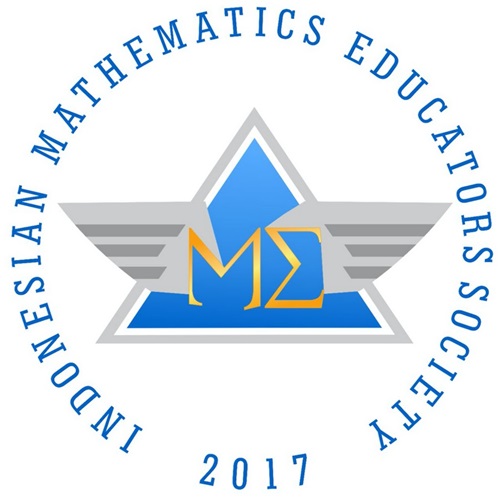Analysis of Numerical Literacy Ability by Self Efficacy of Junior High School Students
DOI:
https://doi.org/10.22437/edumatica.v12i02.18429Keywords:
numerical literacy, self-efficacyAbstract
Numerical literacy ability is currently most highly discussed in education. Numerical literacy ability is the ability that forms the basis for students in solving mathematical problems and is one of the indicators for the Minimum Competency Assessment (AKM). This study analyzes numeracy literacy skills regarding self-efficacy in junior high school students. The research method used in this research is descriptive qualitative. The data was taken using a questionnaire and an essay test instrument. The subjects in the study were students who represented the category of self-efficacy, namely students with low, medium, and high abilities. The results showed that students in the high self-efficacy category met four indicators of numeracy literacy skills, namely, the problem understanding process, the problem modeling process, the process of using concepts in solving problems, and the process of interpreting and evaluating problems. Students with moderate self-efficacy fulfill three indicators of numeracy literacy skills: problem understanding, problem modeling, and the process of using concepts in solving problems. Meanwhile, students with low self-efficacy fulfill one indicator of numeracy literacy ability, namely the process of understanding the problem. Therefore, the results of this study indicate that the better the students' self-efficacy, the better their numeracy literacy skills are.
Downloads
References
Ahmad, A., Safaria, T., & Preston University Pakistan. (2013). Effects of Self-Efficacy on Students' Academic Performance. Journal of Educational, Health and Community Psychology, 2(1).
Ambarwati, D., & Kurniasih, M. D. (2021). Pengaruh Problem Based Learning Berbantuan Media Youtube Terhadap Kemampuan Literasi Numerasi Siswa. Jurnal Cendekia : Jurnal Pendidikan Matematika, 5(3). https://doi.org/10.31004/cendekia.v5i3.829
Anderha, R. R., & Maskar, S. (2021). Pengaruh Kemampuan Numerasi Dalam Menyelesaikan Masalah Matematika Terhadap Prestasi Belajar Mahasiswa Pendidikan Matematika. Jurnal Ilmiah Matematika Realistik, 2(1).
Ayuningsih, N. P. M., & Dwijayani, N. M. (2019). Pengaruh Model Pembelajaran Treffinger Berorientasi Kearifan Lokal Berbantuan Tugas Berjenjang Terhadap Self Efficacy Dan Kompetensi Strategis Matematika Siswa Sekolah Menengah Pertama (SMP). Kreano, Jurnal Matematika Kreatif-Inovatif, 10(1). https://doi.org/10.15294/kreano.v10i1.14916
Bandura, A. (1997). Self-Efficay: The Excercise of Control. In Springer Reference.
Bandura, A., Freeman, W. H., & Lightsey, R. (1999). Self-Efficacy: The Exercise of Control. Journal of Cognitive Psychotherapy, 13(2). https://doi.org/10.1891/0889-8391.13.2.158
Chan, H. Z., & Abdullah, M. N. L. Y. (2018). Validity and reliability of the Mathematics Self-Efficacy Questionnaire (MSEQ) on primary school students. Pertanika Journal of Social Sciences and Humanities, 26(4).
Geraldine, M., & Wijayanti, P. (2022). Literasi Matematika Siswa dalam Menyelesaikan Soal PISA Konten Change and Relationship Ditinjau dari Self Efficacy. Jurnal Riset Pendidikan Dan Inovasi Pembelajaran Matematika, 5(2), 82-102. https://doi.org/https://doi.org/10.26740/jrpipm.v5n2.p82-102
Indrawati, Fiqi Annisa, & Wardono. (2019). Pengaruh Self Efficacy Terhadap Kemampuan Literasi Matematika dan Pembentukan Kemampuan 4C. Prisma, Prosiding Seminar Nasional Matematika, 2.
Kemendikbud. (2017). Materi Pendukung Literasi Sains. Gerakan Literasi Nasional.
Listiani, W. O. (2013). Peningkatan Kemampuan Berpikir Kritis Matematik dan Self- Efficacy Siswa Sekolah Menengah Atas Dengan Model Pembelajaran Berbasis Masalah Kontekstual. Jurnal Pendidikan Maematika, 8(1).
Muhazir, A., Hidayati, K., & Retnawati, H. (2021). Literasi matematis dan self-efficacy siswa ditinjau dari perbedaan kebijakan sistem zonasi. Pythagoras: Jurnal Pendidikan Matematika, 15(2). https://doi.org/10.21831/pg.v15i2.36255
MZ, Z. A., & Muhandaz, R. (2019). Profil Kesulitan Belajar Matematika dan Self efficacy Matematis Siswa Sekolah Menengah di Riau. Suska Journal of Mathematics Education, 5(2). https://doi.org/10.24014/sjme.v5i2.8254
Puspaningtyas, N. D., & Ulfa, M. (2021). Pelatihan Soal Matematika Berbasis Literasi Numerasi pada Siswa SMA IT Fitrah Insani. Jurnal Pengabdian Masyarakat MIPA Dan Pendidikan MIPA, 4(2). https://doi.org/10.21831/jpmmp.v4i2.37504
Rahmi, R., Febriana, R., & Putri, G. E. (2020). Pengaruh Self-Efficacy terhadap Pemahaman Konsep Matematika Siswa Pada Pembelajaran Model Discovery Learning. Edumatica : Jurnal Pendidikan Matematika, 10(01). https://doi.org/10.22437/edumatica.v10i01.8733
Salvia, N. Z., Sabrina, F. P., & Maula, I. (2022). ANALISIS KEMAMPUAN LITERASI NUMERASI PESERTA DIDIK DITINJAU DARI KECEMASAN MATEMATIKA. ProSANDIKA UNIKAL (Prosiding Seminar Nasional Pendidikan Matematika Universitas Pekalongan), 3(1), 351-360.
Sari, I. L., Irawan, E., Aristiawan, A., & Rokmana, A. W. (2021). Analisis Tingkat Penalaran Peserta Didik SMP dalam Memecahkan Masalah Soal Evaluaasisi Berbasis Literasi Numer. Jurnal Tadris IPA Indonesia, 1(3), 333-342. https://doi.org/10.21154/jtii.v1i3.135
Sari, N. R., Hidayat, W., & Yuliani, A. (2019). Analisis Hasil Belajar Matematika Siswa Kelas X SMA Pada Materi SPLTV Ditinjau Dari Self-Efficacy. UNION: Jurnal Ilmiah Pendidikan Matematika, 7(1). https://doi.org/10.30738/union.v7i1.3776
Sari, R. H. N., & Wijaya, A. (2017). Mathematical literacy of senior high school students in Yogyakarta. Jurnal Riset Pendidikan Matematika, 4(1). https://doi.org/10.21831/jrpm.v4i1.10649
Sugiono. (2016). Metode Penelitian Kuantitatif, Kualitatif, dan R&D. Alfabeta, cv.
Sulistiya, S., Rochmad, & Dewi, N. R. (2021). KEMAMPUAN LITERASI MATEMATIKA DITINJAU DARI SELF-EFFICACY PADA MATERI TRIGONOMETRI SISWA KELAS X. JUMLAHKU: Jurnal Matematika Ilmiah STKIP Muhammadiyah Kuningan, 7(2), 149-159.
Widiastuti, E. R., & Kurniasih, M. D. (2021). Pengaruh Model Problem Based Learning Berbantuan Software Cabri 3D V2 terhadap Kemampuan Literasi Numerasi Siswa. Jurnal Cendekia : Jurnal Pendidikan Matematika, 5(2). https://doi.org/10.31004/cendekia.v5i2.690
Zaidah, A. (2021). Analisa Kemampuan Literasi Numerasi dan Self-Efficacy Siswa Madrasah dalam Pembelajaran Matematika Realistik. Jurnal Ilmiah Wahana Pendidikan, 7(7), 300-310.
Downloads
Published
How to Cite
Issue
Section
License
Copyright (c) 2022 Adinda Putri Salsabilah, Meyta Dwi Kurniasih

This work is licensed under a Creative Commons Attribution-NonCommercial-ShareAlike 4.0 International License.







